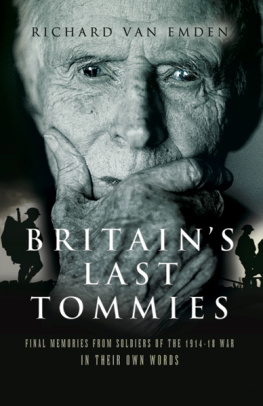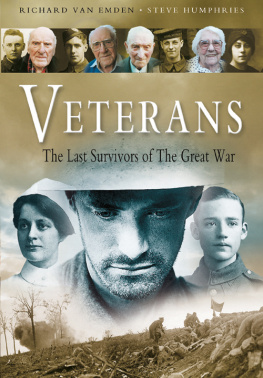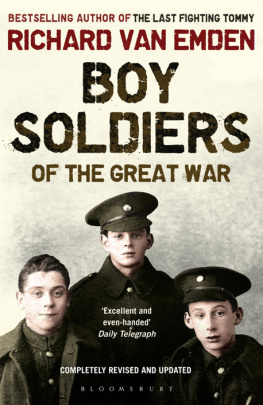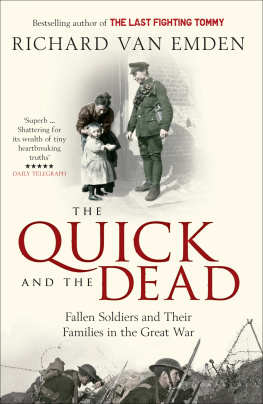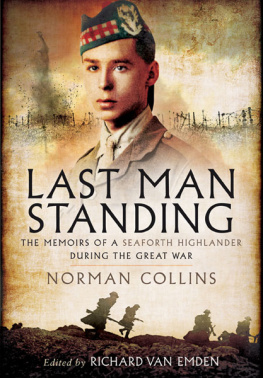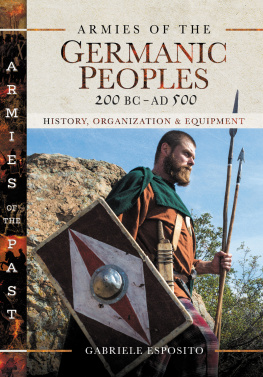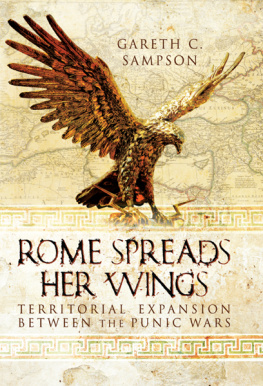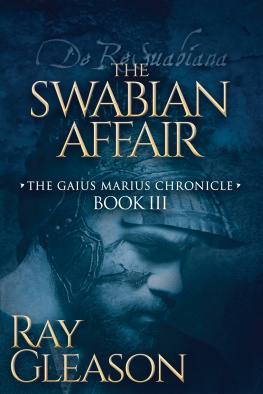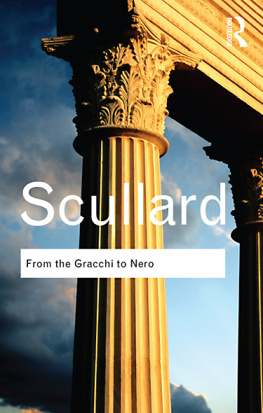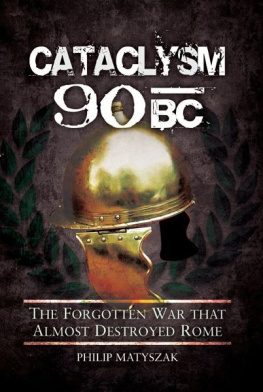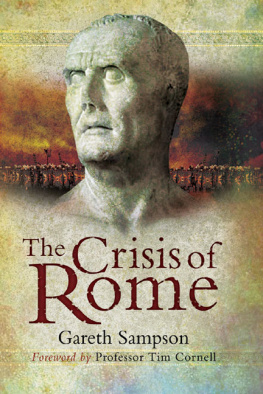Also by Richard van Emden:
Boy Soldiers of the Great War
All Quiet on the Home Front
Last Man Standing
The Trench
Prisoners of the Kaiser
Veterans: The Last Survivors of the Great War
Tickled to Death to Go
First published in Great Britain in 2005 by
Pen & Sword Military
An imprint of
Pen & Sword Books Ltd
47 Church Street
Barnsley
South Yorkshire
S70 2AS
Copyright Richard van Emden, 2005
ISBN: 1 84415 315 0
PRINT ISBN: 978 1 84415 315 2
PDF ISBN: 978 1 78337 475 5
EPUB ISBN: 978 1 84884 563 3
PRC ISBN: 978 1 84884 562 6
The right of Richard van Emden to be identified as Author of this work has been asserted by him in accordance with the Copyright, Designs and Patents Act 1988.
A CIP catalogue record for this book is available from the British Library
All rights reserved. No part of this book may be reproduced or transmitted in any form or by any means, electronic or mechanical including photocopying, recording or by any information storage and retrieval system, without permission from the Publisher in writing.
Printed and bound in England By CPI UK
Pen & Sword Books Ltd incorporates the Imprints of Pen & Sword Aviation, Pen & Sword Maritime, Pen & Sword Military, Wharncliffe Local History, Pen & Sword Select, Pen & Sword Military Classics and Leo Cooper.
For a complete list of Pen & Sword titles please contact
PEN & SWORD BOOKS LIMITED
47 Church Street, Barnsley, South Yorkshire, S70 2AS, England
E-mail:
Website: www.pen-and-sword.co.uk
Dedicated to Matthew, whoever he was
CONTENTS
ACKNOWLEDGEMENTS
I owe a particular thank you to all the staff at Pen & Sword Books who have worked tirelessly to help produce this book under relentless time pressures, and particularly to Roni Wilkinson for his encouragement and willingness to go beyond the call of duty to typeset this book at speed; thanks also to Jon Wilkinson for the excellent jacket design which ensured that this book will stand out amongst so many others on the military book shelf. I am also grateful to everyone at Pen & Sword, and especially to Charles Hewitt and Paula Brennan for their enthusiasm for and belief in the book. I would also like to thank the photographer Roderick Field for his excellent pictures.
As always, I would like to highlight the help of my very good friend Taff Gillingham who was always on hand to answer my technical questions, as well as many other queries of a more general nature, from his undoubted expertise. I would also like to thank Jeremy Banning for his invaluable help chasing down facts and figures for me, proving what an excellent researcher he is. I am also grateful to the staff of the Sound Archive at the Imperial War Museum, particularly Richard McDonough, Richard Hughes and Lucy Farrow for their kind help and for providing, usually at short notice, the recordings of Frank Sumpter, Joe Armstrong, G B Jameson, Joe Yarwood, Norman Dillon and Clarrie Jarman, from which extra details were garnered which augmented my own tape recordings. In the same vein, I would like to thank Vic and Diane Piuk, my friends on the Somme, for very useful extra material from their recordings of the remarkable Richard Hawkins.
A huge thank you also goes to Ryan Gearing and his partner Sarah, for all their help and kindness, and to Richard McCoombe as well as to all those who regularly offer me support and ideas, including Peter Barton, Denis Goodwin, Steve Humphries and Nick Fear. Once again, I would like to thank my wife, Anna, for putting up with interminable hassle, my agent Jane Turnbull for all her care and devotion and my mother, Joan van Emden, who has once more proved herself indispensable with her wealth of knowledge of the English language, and willingness to check my text.
This is the last purely oral history I will write on the Great War, and I would like to send my absolute heartfelt thanks to all those veterans, living or dead, who have given their time and effort to let me write about them and their memories. I have been given twenty years of enjoyment and fascination talking to these men, and it is a debt I can never replay.
INTRODUCTION
O N MY WALL AT HOME, I have a list of the last surviving veterans who served on the Western Front. Seven years ago, their names filled a 71-page spreadsheet, with approximately six or seven names to a page. Three years ago, they filled several pages of A4. Now, in August 2005, their six names cover barely one.
They are:
Henry Allingham, born 1896: Mechanic, Western Front 1917-1918
Alfred Anderson, born 1896: Infantryman, Western Front 1914-1916
Harold Lawton, born 1899: Infantryman, Western Front 1918
Harry Patch, born 1898: Infantryman, Western Front 1917
George Rice, born 1897: Infantryman, Western Front 1918
William Young, born 1900: Wireless Operator, Western Front 1918
In addition, there are three veterans of the navy: Kenneth Cummings, Claude Choules, and William Stone; one of the Merchant Navy: Nicholas Swarbrick; and five men who were in uniform but did not serve abroad. (Sydney Lucas, Bob Rudd, Bert Clark, Harry Newcombe, and William Roberts.)
This year, we have lost William Elder, Charles Watson, Gerald Stickells, Alfred Finnigan, Albert Smiler Marshall, Cecil Withers, and Fred Lloyd; last year, Edward Rayns, Arthur Halestrap, Arthur Barraclough, Jim Lovell, Arthur Naylor, Percy Wilson, John Oborne, Jonas Hart, William Burnett, John Ross, Jasper Hankinson, Albert Dye, Albert Williams, Henry Fancourt, Tom Kirk, Ernest Issacs, and Harry Ward twenty-four in all, far more than survive. It is for this reason that I have written these stories now; there will be no opportunity to write another such book.
It is an oral history. Over the last twenty years, I have met and recorded nearly 270 servicemen; I owe them all a huge debt of gratitude. It has been my aim to offer to the reader many of the best stories that I have heard since 1990. The 90s were the last decade in which we were fortunate enough to have a large number of Great War survivors, and as such 1990 is not simply an arbitrary cut-off point for stories. Nevertheless, in writing a book that calls itself Britains Last Tommies, I would be disingenuous if I included those who had died perhaps ten years before that date. Every man who appears in this book lived well into his nineties, indeed, of the sixty-three quoted, fifty-two lived to reach their hundredth birthday, and nineteen lived to 105 or more. The average age of the men in this book is over 103, and rising!
In an old file, I came across a statistic that in 1990 there were 39,000 surviving servicemen of the Great War. Where this figure came from, I now have no idea, but it does not seem an unreasonable number. If approximately 6 million men served in the forces between 1914 and 1919, then 39,000 represents the last 0.65 per cent, a number small enough for these men to be called the last Tommies. This said, I have weighted the book decisively in favour of those who are either still alive or have died in the last ten years, that is, at least 80 years since the start of the Great War.
We have had more than our fair share of time with these men. Their generation has lived far longer than was expected of any previous one. In 1986, during the BBC broadcast from France to commemorate the 70th anniversary of the Battle of the Somme, a reporter noted that soon these men will be gone. If he was talking about the Somme, his prediction was nineteen years in the fulfilling. When Albert Smiler Marshall died on 16 May this year, he took with him the last living memories of the battle of 1916: while serving with the yeomanry, he had waited behind the lines on 1 July, ready to exploit the expected break-through which never came. Later that month, he dug trenches and buried the dead between the village of Contalmaison and Mametz Wood. If, on the other hand, the reporter meant all those who served in the Great War, then we are still waiting for the inevitable. These six represent approximately one in every million men who served abroad. In the past, when one died, another was found to keep alive the memory of those days. No new veterans have come to light in the last year, and it now seems unlikely that any more will. These six are the last.
Next page
